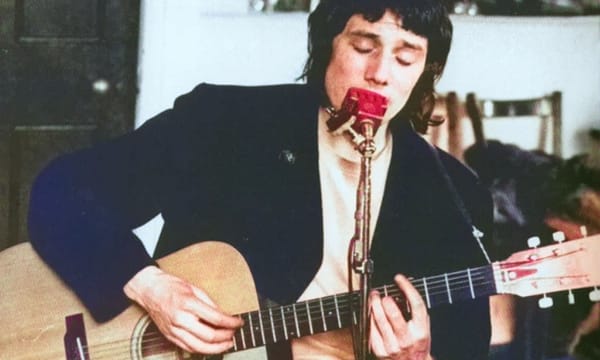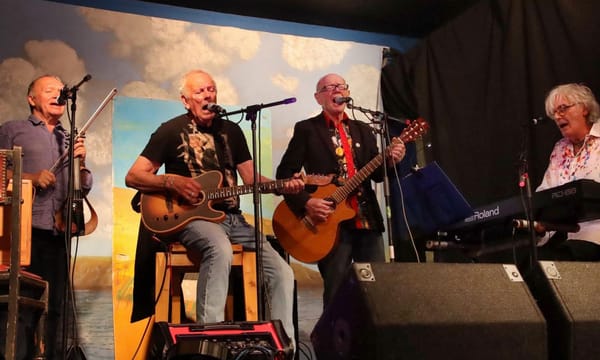Song-by-song with Ward White's 'Here Come The Dowsers'

We caught up with Ward White to get the lowdown on his latest creation and his debut release with Think Like A Key Music. As his fifteenth album, it promises to be a milestone in his illustrious career. Here’s what he had to say: Here Come the Dowsers is a song-cycle about the history of the movie business in Los Angeles, arranged as non-sequential vignettes harkening from the silent era, to present day, voiced by different cogs within the Hollywood machine: Director, producer, fading ingenue, stunt double, script-doctor, art director, agent…
SONG-BY-SONG
Continuity concerns the existential crisis of Burt Reynolds’ stunt-double, whose custom elevator shoes have been purloined by a disgruntled hotel porter / aspiring actor.
The first song written for the record, which set the tone for the remainder of the proceedings. Not based on a specific stuntman, but (possibly) partially inspired by the apocryphal story of Burt’s stunt double being eaten during the production of Samuel Fuller’s SHARK!.
Here Come the Dowsers is a rumination on the speculative history of Los Angeles and the film industry, touching on the end of the missions, the rise and fall of the Cinerama era, and the disposable culture of the present day.
An overture, of sorts, to establish the lay of the land. Mentioning feared Hollywood gossip-columnist Louella Parsons in the chorus isn’t going to make me a Spotify darling, but that ship has sailed. The mashup of Cinerama epic titles includes a nod to Telly Savalas’ improbable turn as Pontius Pilate.
Cliffhanger is the lament of a faded and forgotten starlet, clawing for a return to relevance through a late-career, festival-darling performance.
I’m rather fond of the slightly unhinged guitar solo in this number, making it sound like a refugee from some long-lost Neil Young disco album.
Our Town skewers a certain iconic American ‘burg, poisoned by hypocrisy and secrets. Maybe yours, maybe mine.
Continuing the trend from the title track, this song references Louella Parsons’ arch-nemesis (and former protege) in the Tinseltown gossip racket, Hedda Hopper. As I am tragically bereft of the ability to whistle convincingly, mix engineer John Spiker was called in as a ringer for the outro.
Johnny Fontane is the defiant cri de coeur of an aging old-guard studio head, clinging to his personal Horatio Alger narrative while heaping scorn on the business that made him a titan.
A reference to The Godfather, and the character of Jack Woltz (“Johnny Fontane never gets that movie!”), who was purportedly based on Columbia Pictures head, Harry Cohn, but for the purposes of this song it’s an amalgam. The hungover understudy Ziegfeld Girls chiming in on the choruses are all me, without the aid of pitch-shifting technology.
Common Thread: In a business run by blockbuster blockheads, the overworked, under-appreciated script doctor reluctantly squanders his gift.
Shamelessly name-dropping Paddy Chayefsky to court the TikTok crowd.
Blimp Street is a keyhole view into the domestic travails of the wardrobe stylist, and her long-suffering husband, the grip.
Inspired by my stumbling upon an actual ‘Blimp Street’, in Frogtown; I concocted the dirigible-hangar history, and followed the trail straight to the Pretty Things’ S.F. Sorrow reference (Balloon Burning) in the chorus.
Slow Sickness: Wherein the super-agent ponders his golden handcuffs.
The loneliness of the 10% man, with a nod to Joni’s burnt-out David Geffen from Free Man In Paris. Mostly just a vehicle for the electric sitar solo.
Horse Operas: A veteran art director considers retirement, while suffering the ego of a legendary cinematographer’s less-talented scion.
The perils of holding on too long (What else are you gonna do with yourself?), watching the industry change, pondering the value of hard-earned wisdom in the face of nepotism, and a whole lot of cocaine. For the unfamiliar, ‘Horse Opera’ was a pejorative term for the cheap, formulaic westerns churned out by the hundreds during Hollywood’s formative years.
Pick Up Your Face: Former “it” girl, now mostly famous for botched plastic surgery, gives what-for to a dismissive interviewer.
The fictional dance-craze, ‘The Tyrone Dip’, referenced in the song’s bridge, was inspired by a deep dip in Burbank Blvd., at the intersection of Tyrone Avenue in Van Nuys. If that knowledge doesn’t significantly enhance your enjoyment of the music, then I am at a loss.
Speak, Harry: In 1936, Houdini’s widow, Bess, holds one final Halloween seance on the roof of the Knickerbocker Hotel in Hollywood. No contact is made.
Ironic that, for all his star power, Harry Houdini never managed to break into the movie business (one or two pictures that failed to gain significant traction.) His widow’s worldwide radio broadcast of the final attempt to reach her late husband was, however, pure Hollywood gold.
PERSONNEL ON THE ALBUM
Ward White Writer, producer, all vocals, guitars, and bass; Mark Stepro (The Wallflowers, Butch Walker, Ben Kweller); Drums, percussion; Tyler Chester (Grammy-winner; Madison Cunningham, Andrew Bird, Jackson Browne); Keyboards; John Spiker (Grammy-winner, Golden Globe-nominee; Tenacious D, Beck, Beth Orton) Mix Engineer and Joe Lambert (Grammy-nominee) Mastering Engineer.
Album released May 17, 2024 as Think Like A Key Music cat. #1174
on CD and Digital / Streaming platforms
For more artist information please visit wardwhite.net




